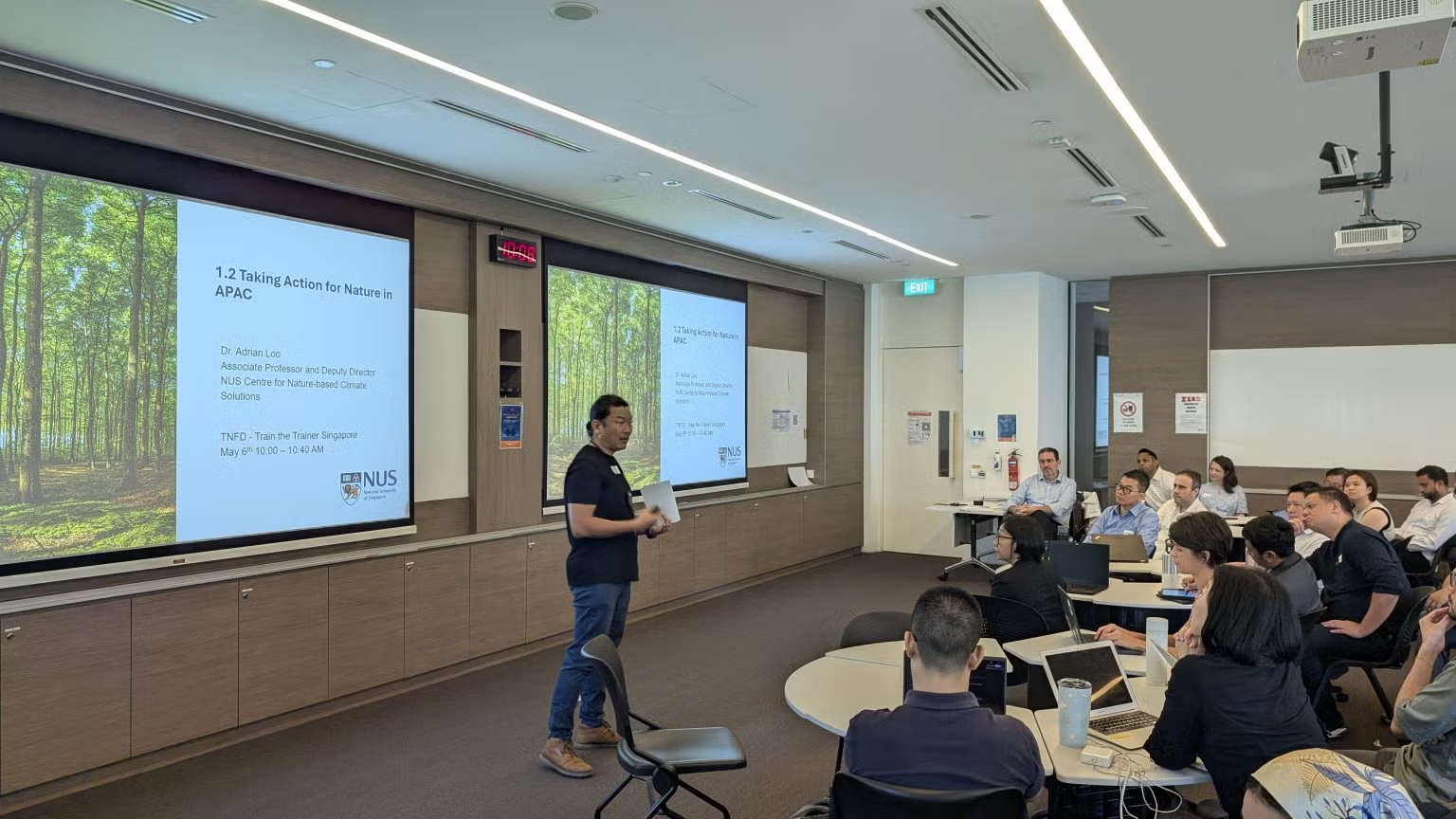Nature means business: When biodiversity enters the boardroom

The prosperity of businesses and civilisations is closely intertwined with the natural capital and ecosystem services that underpin them.
To drive a shift in capital flows and operations from activities that harm nature to those that preserve and restore it, the Taskforce on Nature-related Financial Disclosures (TNFD) published its final recommendations in September 2023 to provide a framework for organisations to identify, assess, manage, and disclose nature-related risks and opportunities. The framework was recently adapted into a set of training materials to reach market participants from diverse sectors across the world and enable them to customise the educational content to suit their local contexts.
To this end, the newly launched NUS Sustainability Academy, together with TNFD, co-delivered a three-day Train-the-Trainer regional workshop on nature-related reporting at NUS University Town from 6 to 8 May.
The workshop attracted 61 participants from China, Hong Kong, India, Indonesia, Japan, Malaysia, Vietnam, Thailand, and Singapore. They comprised trainers and practitioners from academia, industry, consulting, government and NGO sectors.
Professor Koh Lian Pin, Vice President (Sustainability and Resilience) and Chief Sustainability Scientist at NUS, said: “We hope the participants can help build capacity in their own networks, organisations and communities, so that more people can catalyse nature-positive decisions and operations at scale.”
He added that globally, political support for the nature conservation is waning, and there seems to be a hesitation in advancing investments and funding to halt biodiversity loss.
In times like these, he said it is imperative that the private sector shows “strong leadership, bolstered by responsible governance, strategy and transparency, for nature-positive action”.
Mr Tony Goldner, the CEO of TNFD, who led the Singapore workshop with TNFD’s technical team members, added that business and finance require increased confidence and capacity on nature and TNFD, before they can take action on nature-related issues.
He said: “Carrying out Train-the-Trainer programmes in new regions and markets is a key piece of the effort to improve access to high-quality learning and education materials globally and across roles and sectors. With this workshop, hosted in Singapore and focused on the APAC region, trainers will now have a stronger grasp of the TNFD's publications, recommendations and guidance, and access to the tools and resources to upskill the market.”

Training the Trainer workshop overview
Contributing to the pedagogy and delivery at the Singapore workshop were Associate Professor Adrian Loo from the NUS Centre for Nature-based Climate Solutions, Mr Alvin Lim, a Senior Fellow at NUS Centre for Governance and Sustainability, and Mr Leo Nyein Zaw Ko, a Research Associate at NUS Sustainability Academy.
Drawing from their varied experiences, the NUS speakers shared their perspectives on how the TNFD approach and training materials can be contextualised to Asia-Pacific regional issues.
Using a hypothetical case study, participants were also taken through TNFD’s LEAP approach, an integrated method for assessing nature-related issues through Locating, Evaluating, Assessing, and Preparing (LEAP) phases to respond to and report on nature-related dependencies, impacts, risks, and opportunities.
Three guest speakers from the industry, Ms Trista Chen, Co-Lead of the Global Investment Stewardship at L&G Asset Management, Ms Melissa Ker Zia Moi, Head of Sustainable Business at UOB, and Ms Esther An, Chief Sustainability Officer at CDL, complemented the workshop delivery with their industry experience in going through the LEAP process and adopting TNFD’s approach.
UOB and CDL are among the early adopters of TNFD approach in Singapore. CDL recently received a S$400 million sustainability-linked loan from DBS, with criteria guided by targets set in its inaugural TNFD report.

Looking ahead
As people become more aware of biodiversity loss, and investor expectations and consumer sentiments shift towards more sustainable business models, the number of TFND adopters looks set to rise globally in the coming years.
Currently, Asia leads the adoption rate, with more than 200 companies (nearly 50 per cent of adopters globally) pledging to disclose nature-related issues at the Conference of the Parties (COP) at the UN Convention on Biological Diversity (CBD) in October 2024.
In Singapore, the public sector is leading sustainability reporting with its inaugural GreenGov report, published in 2023, while NUS is spearheading the capacity building on nature-related issues. On 6 May, the University launched the NUS Sustainable Futures, a whole-of-university initiative that drives interdisciplinary research and education to address climate change and sustainability challenges through collaborative efforts across various sectors.
The TNFD Train-the-Trainer workshop is the first training event of NUS Sustainability Academy, a key pillar under NUS Sustainable Futures. In the aftermath of the workshop, a research brief on TNFD was published in the Eye on the Planet bulletin from NUS Centre for Nature-based Climate Solutions, summarising the learnings from the workshop.
Going forward, NUS Sustainability Academy will continue to work with internal and external stakeholders to bring more trainings and educational materials to market participants to build their confidence and capacity in nature-related issues.
This article is contributed by NUS Sustainability Academy.
